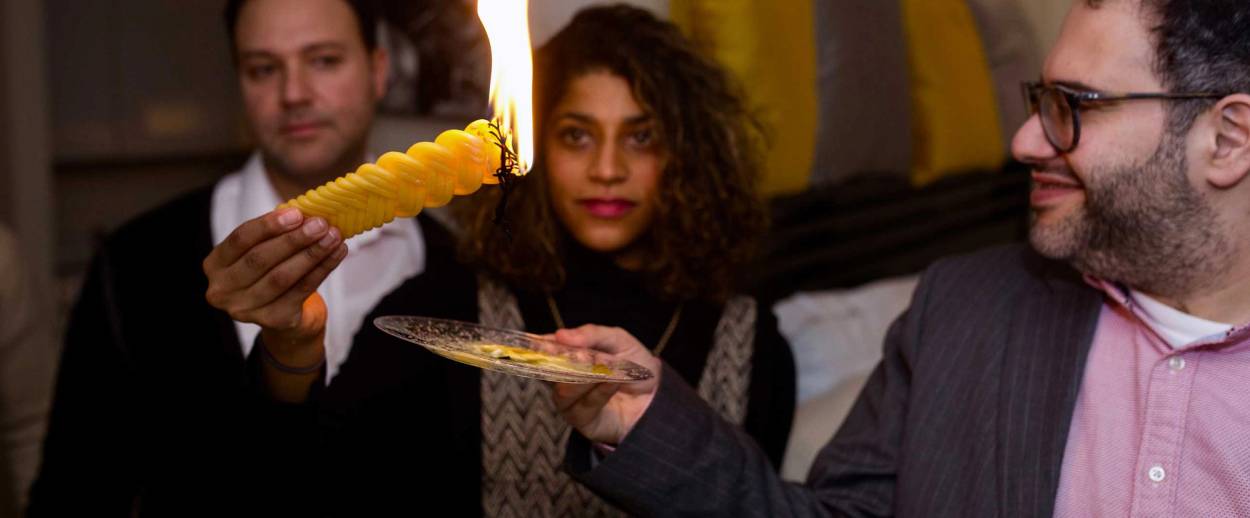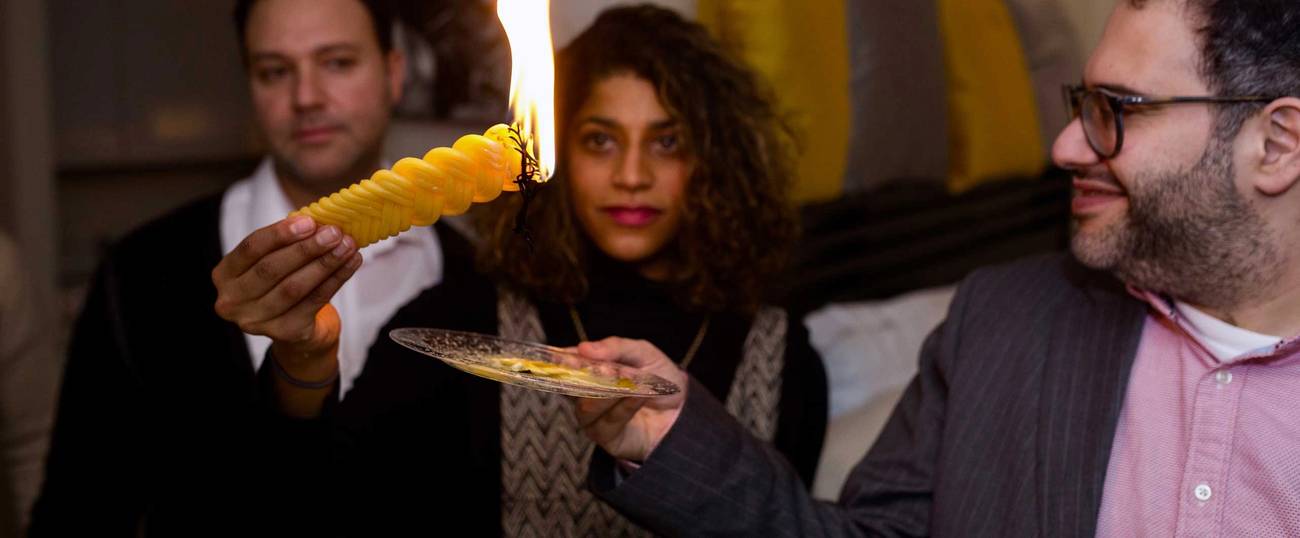Cooking Up a Diverse Community
A new group called Kugel brings together the ‘multicultural bubble’ of New York’s Jewish scene




It all started with a broken engagement.
It was April 2018, and Simone Weichselbaum was newly single. One of the reasons she and her fiancé had split was her anxiety about moving to his homogeneous Jewish community outside Manhattan.
Weichselbaum, now 37, grew up modern Orthodox in what she calls the “multicultural bubble of the New York City Jewish scene,” filled with people from diverse backgrounds, like her. (She’s half Jamaican, half German-Jewish.) In her fiancé’s world, in contrast, she found herself surrounded almost exclusively by American Ashkenazi Jews, with nary a foreign accent or nonwhite shade of skin between them. “It was my first time feeling ‘othered,’” she said.
Back in Manhattan, Weichselbaum cheered herself up post-breakup by holding Shabbat meals with her eclectic group of Jewish friends. But “being the ambitious person that I am, [that] wasn’t enough,” she said. “I wanted to create a community.”
Her inspiration came, in part, from a group called Chulent, which started in 2004 and whose gatherings Weichselbaum used to attend in Manhattan. (The group has since moved to Brooklyn.) It was at a Chulent event in 2008 that she met Yossi Rosenberg, 38, who went on to become her closest friend. At one of their Shabbat lunches last summer, the two started talking about creating a new version of Chulent for young Jewish professionals. Since Chulent—from the name for traditional Jewish stew, cholent—was already taken, a friend suggested another Jewish food name: kugel.
*
The main goal of Kugel is to “bring together Jewish singles in our age group who do interesting things,” Weichselbaum explained. In particular, Kugel targets Jews in what she called “the gray zone”—people who feel connected to their Jewish identity, but are not necessarily highly observant. “Jews in my orbit pick and choose what they want to observe,” said Weichselbaum. “Kugel doesn’t judge.”
So far, Kugel has had a handful of events, including two “Shabbat hangouts,” held at a friend’s apartment that was koshered so that observant Jews could participate. These are two-part gatherings: First, there is lunch by invitation for 15 to 20 people. (A recent lunch, the first of what Weichselbaum hopes will be a series of meals showcasing food across the Diaspora, included Moroccan fare prepared by chef Jonathan Hartig.) After lunch, another 20 or so guests arrive for an afternoon of conversation, games, drinking, and singing by Kugel’s chazzan Aron Gerstel, 36, a self-described “jukebox” of Hasidic tunes. Guests then participate in Havdalah, followed by more singing and guitar playing, for those who wish to linger.
Weichselbaum likened a Kugel gathering to “a drinking party at a friend’s house. You can take off your shoes and relax. It’s not like going to a synagogue space.”
The events so far have been attended by a diverse mix of people, from biracial Jews to recent converts to secular Israelis. Rachel Aliana, 28, a Jew by choice who grew up in France, moved to the U.S. four years ago, and describes herself as “cool Orthodox”—she is observant, but follows fashion trends and regularly attends yoga classes—said the Kugel hangout she went to was more diverse than many Jewish gatherings she’s attended.
In addition to including an eclectic mix of guests, Kugel’s creators also want hangouts to have a salon atmosphere. At a recent event, for example, Matt Green spoke to guests about The World Before Your Feet, the recently released documentary that describes his six-year walking tour of New York City. Still, because some Kugel participants are observant, it’s important to its founders that activities are respectful of Shabbat. “If it involves a mic, it happens after Havdalah,” Rosenberg said.
Wanting to add a rabbinic presence to the Kugel experience, Weichselbaum also invited Rabbi Avi Heller on board. Heller, 45 and the Orthodox Union’s regional director for synagogues in New Jersey and Rockland County, met Weichselbaum through the Manhattan Jewish Experience, an organization that brings together millennial Jews from diverse backgrounds through courses, trips, and other programs.
When Weichselbaum told Heller about Kugel last fall, he had just been hired as the director of MJE’s East Side branch. Weichselbaum serves as an MJE fellow, a role that includes organizing events for her peers. She decided to do this part of her fellowship on the Manhattan’s Upper East Side, where she lives.
The timing was perfect: As the new director of MJE East, Heller’s job is to help “create microcommunities” of Jews, as he put it, on the Upper East Side. Heller agreed that MJE East would provide some of the funding for Kugel events and would promote them to its participants.
The two groups share not only a similar mission but also an inclusive approach to Jewish engagement. “There are Jews who don’t always feel like they fit in at traditional synagogues,” said Heller, such as Jews of color and recent converts. “We’re giving them an environment where they feel comfortable being who they are.” But for Heller, these events are about more than simply bringing people together. “My people are the ones who want to move the needle spiritually,” he said.
For her part, Weichselbaum would be pleased if some Kugel participants paired off, too—and she thinks the relaxed atmosphere at Kugel gatherings will help make that happen. “In the old days you’d meet people through friends,” she said. “Why not go back to that?” If people spend the afternoon chatting, maybe drinking a bit, she said, “sooner or later you’ll get a marriage out of that, God willing.”
Troy Valberg, 33, attended a recent Kugel hangout and appreciated the laid-back vibe. “It didn’t have the formalities and ceremonies of a Friday night dinner,” said Valberg, who was raised by a Dominican mother and Ashkenazi father and had little formal Jewish education, but underwent Orthodox conversion as an adult and now identifies as modern Orthodox. At the same time, he said, because events follow the laws of Shabbat observance, there’s little “outside noise” to distract people. “You can’t sit there and be on your phone,” he said.
Of course, in New York City, there are many options for young Jews looking to meet up, including the aforementioned Chulent, and Tribe, a group that was started in 2014 by members of two Reform congregations looking to help millennial Jews connect outside the walls of a synagogue.
The groups differ in the types of people they target and attract, however. Most people who attend Chulent events, for example, “identify as some kind of Orthodox or have an affinity for Orthodoxy,” including some non-Jews, said founder Isaac Schonfeld, 56. Although funded by Reform congregations, Tribe considers itself nondenominational, said its clergy advisor, Cantor Lucy B. Fishbein, 31. But because many of Tribe’s events do not follow halacha—a monthly event called “Shabbat and Schmoozin’,” for example, is held on Friday nights at a Manhattan bar—they tend to draw fewer observant Jews, she said.
Still, the groups share the same basic goal: giving young Jews opportunities to connect outside an institutional setting. They all employ what Fishbein called a “pop-up engagement model,” which is appealing to millennial Jews, she said, who are often wary of institutions and aren’t joining synagogues at the same rate as previous generations.
There’s even the possibility of collaborations between groups. Dory Leviashvili, 26, and a Tribe board member, attended a recent Kugel event and has spoken with Heller, with whom she works at the Orthodox Union, about partnering for a future event. Since the groups differ in their adherence to halacha, a joint gathering likely wouldn’t take place on Shabbat, she said. Instead, the groups might meet up for a meal on a different night, or participate in a volunteer opportunity together.
Ultimately, Kugel’s creators see differences among Jews as cause for celebration, not division. What’s more, they believe shared experiences will create strong bonds between Jews from very different backgrounds. “If people all unite around something positive, like a Shabbat meal,” said Gerstel, “the rest will fall into place.”
***
Like this article? Sign up for our Daily Digest to get Tablet magazine’s new content in your inbox each morning.
Jennifer Richler is a freelance writer living in Bloomington, Indiana.